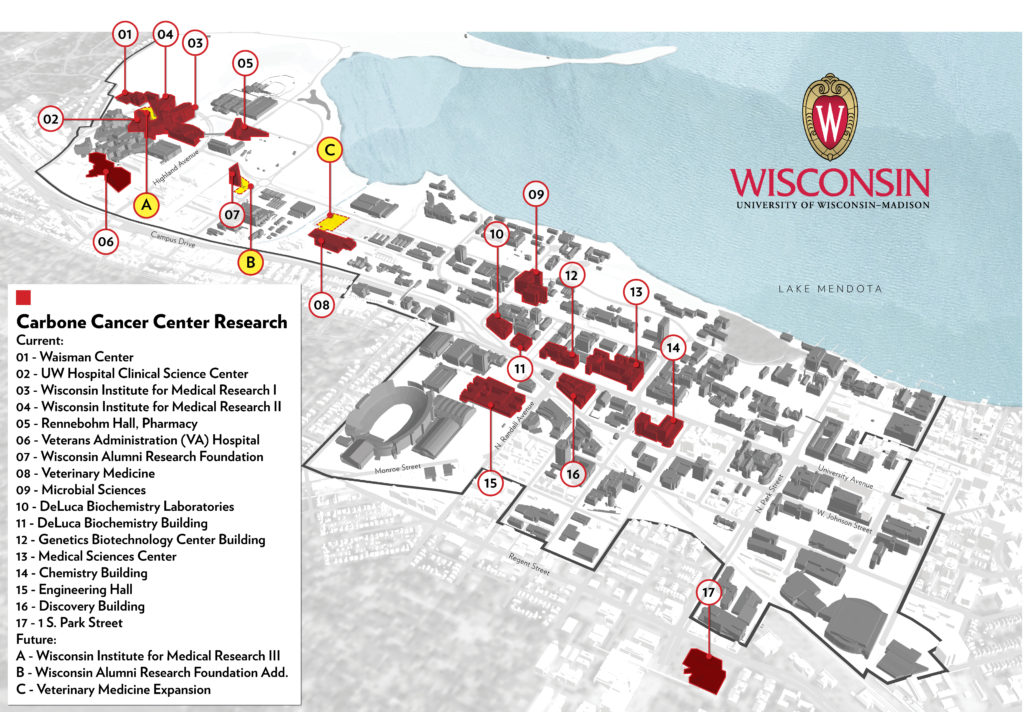The UWCCC entered a period of leadership transition in 2002 when Dr. Niederhuber stepped down as Director. Dean Farrell placed the management of the Center under the Associate Directors, naming George Wilding M.D., then Associate Director for Clinical Research, as Acting Director in November 2002. A search committee formed in the spring of 2003, and in January 2004, Dr. Wilding was appointed the director of the UWCCC. Throughout this grant period, however, the consolidated UWCCC continued to move in a direction that emphasized multidisciplinary and transdisciplinary interactions focused on the translation of basic research findings to clinical testing and application.
After serving for 12 years, Dr. George Wilding stepped down as Director of UWCCC in September 2013. Dr. Wilding guided UWCCC through tremendous growth, including over 30 tenured faculty recruitments and $250M in cancer funding. During the period from 2002 to 2012, an emphasis on transdisciplinary research fostered changes in the management structure, physical growth of facilities and an overall multidisciplinary approach of the UWCCC.
In September of 2013, Dr. Howard Bailey became interim director of UWCCC. Dr. Bailey had been a faculty member since 1994, with near continuous peer reviewed funding, and a member of the NCI subcommittee A (“Parent Committee”) for Core Grant review since 2012.
Dr. Howard Bailey was appointed Director in April 2015.
Dr. Bailey’s Leadership
Under Dr. Bailey’s leadership, leaders and members developed a stronger and deeper communication network. UWCCC has been successful competing for multi-investigator and central cancer-oriented grants during the previous and current CCSG grant period. Some of these included the award of grants for:
- National Cooperative Drug Discovery Group in Cancer
- Establishment of an NCI Center of Excellence in Cancer Communication Research
- Coordination of an NCI Biochemical Prevention Clinical Trial Network
- Transdisciplinary Tobacco Use Research Center
- Bioengineering Research Partnership for the Biomolecular Analysis of Liquid Crystals
- Department of Defense (DOD) Prostate Cancer Research Program Clinical Consortium
Since 2012, the momentum of the UWCCC as a campus transdisciplinary and translational research leader has continued to grow. In the last 15 years, UWCCC space is now approaching a three-fold increase to approximately 389,000 square feet of contiguous space on the west end of campus. The administrative and scientific leadership structure has been considerably strengthened, as a comprehensive review led to the addition of an Associate Director of Basic Science Research, Associate Director of Translational Research, Associate Director of Shared Resources, Assistant Director of Population Health, Assistant Director of Laboratory Sciences, and Assistant Director of Finance and Strategic Planning.
In addition, the UWCCC established an Office of Translational Research Services (OTRS) to serve UWCCC investigators and bolstered clinical research infrastructure with an additional $2M/annual support by adding central office staff and the geographic consolidation of clinical research staff in 10,000 square feet of newly remodeled space within the UWCCC Clinical Science Center above the UWCCC outpatient clinics. Clinical services have grown with continued expansion of clinical facilities, staff and organizational structure.
